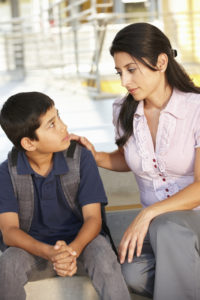
New resources added during the week of July 20-24, 2020. These appear first in the list of resources below. Note: A date in parentheses means the publication date of that resource, not the date we posted it here. This is to let you see at a glance how current the information is.

Updated as of July 20, 2020
This page of resources is part of CPIR’s Coronavirus Suite of information. This page identifies much needed resources for coping with the stress and uncertainty that comes with the coronavirus, the reactions of our children and ourselves, and how to maintain mental and physical well-being during these unprecedented times.
____________
Coping Tips and Other Useful Info
![]() Parenting Disagreements During COVID
Parenting Disagreements During COVID
(2020, July) | Strategies to reduce conflict around staying safe. Also available in Spanish. From the Child Mind Institute.
COVID-19: Medical Communication Access for Deaf and Hard of Hearing
(2020) | During the pandemic, how will you, as a deaf or hard of hearing individual, be able to talk to doctors, nurses, and others at the hospital? This guide is to help you get ready for your hospital visit. Going into the hospital now will be markedly different than you may be used to. Many of the interpreting services won’t be available, and hospital staff will be wearing protective gear that is likely to cover their lips. Other issues may arise. Be prepared. This article tells you how and lists multiple sources of help and information. There’s also a 7-minute video in sign language you can watch.
ExCEL Academy for Students with Visual Impairments
(2020, March-May) | The Virtual ExCEL Academy ran for 10 weeks from March 23-May 29, 2020. Pathways to Literacy brought together over 50 instructors, who provided direct instruction to students with visual impairments across an amazing array of topics. Examples include such sessions as Self-Awareness Success, Fun with Braille, Time for Tots, Marvin’s Market Adventure, Staying Home: Making Connections in the Face of Social Distancing, Intro to Infant Massage for Kids with Visual Impairment, and Know Your Rights: How to be a Self-Advocacy Super Hero! All presentations were recorded and are posted on the Virtual ExCEL Academy Playlist.
A Parent’s Guide: Helping Your Child Feel Good About Wearing and Seeing Others Wear Face Masks
(May 2020) | This practical 1-pager comes from Children’s Specialized Hospital, in partnership with Rutgers University and Kohl’s.
I Can Stay Healthy By Wearing a Face Mask
(May 2020) | From the same source as the above, this is a 12-page, child-friendly resource with lots of pictures of children wearing face masks and simply worded guidance for youngsters about hygiene, the value of wearing a mask, and what to do before and after wearing the face mask.
Supporting Families During the Pandemic | Multiple Resources from the Pyramid Model
(May 21, 2020) | The National Center for Pyramid Model Innovations offers quite an array of helpful tip sheets for families with young children, all of which are available in English and Spanish. These include:
- Helping Your Child During the Pandemic || Ayudando a su hijo durante la pandemia
- Tips for Helping Your Child During the Pandemic || Consejos para ayudar a su hijo durante la pandemia
- Help Us Calm Down: Strategies for Children || Ayúdanos a estar calmados: Estrategias para niños
- Tips for Supporting Yourself During the Pandemic || Consejos para apoyarse a sí mismo durante la pandemia
- Why Can’t I Go to School? || ¿Porque no puedo ir a la escuela?
- I Can Be Safe and Healthy by Washing My Hands! | ¡Puedo estar seguro y saludable lavándome las manos!
How to Ask What Kids Are Feeling
(May 2020) | From the Child Mind Institute, here are suggested ways to get insight into how your kids are handling stressful times. Also available in Spanish.
How to Find a Telehealth Provider for Your Child
(May 2020) | Strategies for parents seeking remote mental health treatment. Also available in Spanish.
Single Parenting During the Coronavirus Crisis
This article from the Child Mind Institute offers strategies for managing when you’re going it alone. It’s also available in Spanish.
10 Ways to Avoid ACEs (During the Pandemic)
ACES stands for adverse childhood experiences. Many of us are concerned that increased stress on our children might increase the risk for ACEs. Here’s some sound advice to consider.
Guidance for Supporting Young Children Through COVID-19
(April 7) | This 12-page guide is packed with resources and recommendations for parents and educators, including how to communicate with grandparents, family, and friends; routines and play; time to teach skills; screen time; talking to your children; and tips from a veteran preschool teacher.
How to Support Your Children (and Yourself) During COVID-19
(April 2020) (Available in Spanish) | This 3-page brief comes from the Center for the Developing Children at Harvard. It focuses on how everyone can help support a child’s healthy development (and relieve their own stress) during this challenging time. Just a few minutes and some simple, free activities can make a difference.
Tips For Social Distancing, Quarantine, And Isolation During An Infectious Disease Outbreak
From SAMHSA.
Ways to Promote Children’s Resilience to the COVID-19 Pandemic
(April 3, 2020) | This 4-page brief from Child Trends draws on over four decades of research on resilience and the protective factors that can buffer children from harm and increase their chances of adapting positively to adversities such as the COVID-19 pandemic.
Coronavirus Parenting: Managing Anger and Frustration
It’s understandable: There are probably a lot of parents losing their temper and yelling at their kids during this crisis. This article from the Child Mind Institute talks about how parents can maintain their cool under stress.
A Guide to COVID-19 and Early Childhood Development
(April 10) | In this challenging time, child development has not paused, and supporting children, families, and care providers of all kinds is as important as ever. This guide from the Center for the Developing Children at Harvard pulls together information on COVID-19, including what it means for child development, and shareable resources that can help parents, caregivers, child care providers, pediatricians, and others who work with families. There’s an infographic, a brief, and a resource compilation.
“A Different World”| The Brain Architects Podcast
In this first episode from a special COVID-19 series of The Brain Architects podcast, the director of the Center for the Developing Children at Harvard discusses the COVID-19 pandemic in the context of early childhood development. He offers advice to help ensure that adults and the children they care for don’t experience the long-term effects of stress, and explains how society can work together to continue to support healthy development.
“Self-Care Isn’t Selfish” | Podcast
(April 2020) | In the second episode The Brain Architects, Dr. Rahil Briggs, Director of ZERO TO THREE’s HealthySteps program, discusses how pediatricians are serving their patients during the pandemic, including using telehealth; why caregiver health is child health; and what she hopes the healthcare system can learn as a result of the pandemic.
Coronavirus Response Tool Kit
(April 2, 2020) | The Community Tool Box folks have put together this response kit with a focus on tools for public health (guidance from agencies like CDC and the World Health Organization) and tools for community action (the how-to’s of engagement, assessment, planning, action, and evaluation).
Daily tips (in video form) for parents
Every day, the Child Mind Institute publishes a video and social tile with a tip for supporting families through the coronavirus crisis. Sign up to get these tips, and tell the families you serve to do so, too.
How You and Your Kids Can De-Stress During Coronavirus
From PBS for Parents.
What To Do With Kids At Home On Coronavirus Break For Who Knows How Long (Without Losing It)
Interesting resources and good advice here.
12 World-Class Museums You Can Visit Online
The digital age has made it possible—easy, even—to visit some of the world’s most famous museums from the comfort of your own home, including the Louvre, the National Gallery of Art, the British Museum, the Smithsonian National Museum of Natural History, and NASA.
Would you like to visit another section of the Coronavirus Suite?
____________
Back to the Suite’s Landing Page
Guidance from the U.S. Department of Education (and Others)
COVID-19 Info in Other Languages
Telecommuting Technology and Tips
Coping with COVID-19 for Adults and for Children (you’re already here)

